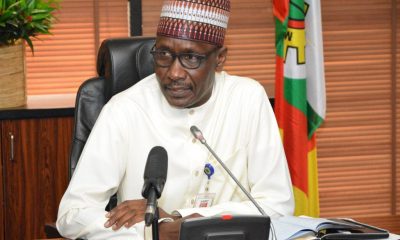Business
Updated: Reps to probe alleged sabotage at Warri refinery

The House of Representatives is set to investigate alleged sabotage at the Warri Refining and Petrochemical Company, which has reportedly stalled its operation.
It has therefore asked the Group Managing Director of the Nigerian National Petroleum Corporation, Mele Kyari, to furnish its Committee on Petroleum Resources (Upstream) with details and circumstances surrounding the storage lease at the company.
The lawmakers mandated the committee to investigate the failure and the neglect by the NNPC to address the haulage challenges such as inadequate storage tanks affecting the Warri refinery to forestall the frequent shutdown of the company and report back to the House in four weeks.
The House passed the resolutions following a motion by Ben Igbakpa (Delta PDP) on the commencement of operations at the Warri Refining and Petrochemical Company.
Igbakpa said the refinery had been mandated to produce refined products from local crude and that the three main sections of the production department, namely: reforming, crude distillation and catalytic cracking units had operated for the past eight years due to the efforts of its personnel.
The lawmaker said the plants were operating at an output of around 115m3/hour translating to about 68 per cent installed capacity.
He listed products being supplied from the refinery as premium motor spirit (PMS) or petrol, automotive gas oil, kerosene, LPG, low pour fuel oil for ships and industrial fuel and carbon black.
The lawmaker said, “The House is disturbed that the refinery has not operated optimally due to alleged top management decisions of the Nigerian National Petroleum Corporation (NNPC) to ground the plant for personal benefit from marketers importing products that can be produced in the refinery;
“Concerned that the plant had severally shut down due to haulage challenges, neglect in the evacuation of products, lack of functional or operational storage tanks and poor maintenance culture on the part of management which also constitutes another reason for the refinery non – functionality;
“Aware of the alleged plan to ground the plant from refining products by members of the top echelon of the Warri Refinery in collaboration with the Chief Operating Officer (COO) as well as diverting crude meant for refining.”
He also said he was “aware that when crude oil is delivered from Escravous tank farm for refining, the products are hoarded for about 14 days and thereafter diverted through the refinery jetty to interested buyers (or specific companies they have special interests in) who pay less. The resultant effects of this perceived economic sabotage is that the plant is brought down because no crude to refine as it has been diverted.
“Further aware that when it became apparent that the management of Warri Refinery has abandoned their responsibility of maintaining the plant, the staff of the refinery on several occasions contributed their money to buy materials and tools to fix faulty equipment.”
The lawmaker said that it was alarming that “currently, most of the spherical tanks used for storage of Liquefied Petroleum Gas (LPG) have been leased out to Kwale Hydrocarbon Nigeria Limited (KHNL), a private company, while other storage tanks are being leased out to private interests all in a bid to ensure that the Warri Refining and petrochemical company remains shut down indefinitely, even when the said refinery has the production capacity of 75 per cent.”
He alluded to the inadequacies at the refinery and others as largely responsible for the crisis in the nation’s petroleum industry sector with regard to supply and pricing.
He said, “Cognizant that the Federal Government has officially confirmed the return of fuel subsidy, as the Petroleum Products Pricing Regulatory Agency (PPPRA) has on 11 March 2021 fixed the pump price of PMS also known as petrol, at N212.61 per liter, for March, which the Minister of State for Petroleum Resources and NNPC has denied yet petroleum marketers sell between N175 – N200 depending on the location;
“Also cognizant that the increase is due to the shutdown of local refineries and create the cost elements of the commodity which the Petroleum Products Price Regulatory Agency ( PPPRA) analyzed as comprising the addition to the ex-coastal price of average lightering expenses, Nigerian Maritime Administration (NIMASA) charges, jetty throughput charges, storage charge and average financing costs with the inclusion of retailers’ margin has now brought the pump price of the commodity to 212.61 per litre.”
Railway
Lagos Rail Mass Transit part of FG free train ride – NRC

Lagos Rail Mass Transit part of FG free train ride – NRC
The Nigerian Railway Corporation (NRC) has disclosed that the Lagos Rail Mass Transit (LRMT) trains are included in the Federal Government’s free train ride initiative for the Christmas and New Year celebrations.
The LRMT, which currently includes the Phase 1 Blue Line Rail and the Phase 1 of the Red Line Rail, operates under the Lagos Metropolitan Area Transport Authority (LAMATA).
This announcement was made by Ben Iloanusi, the Acting Managing Director of the NRC, during an interview on NTA News TV on Friday, following the launch of the initiative earlier that day.
While Iloanusi stated that Phase 1 of both the Blue Line and Red Line Rail projects are part of the program, LAMATA has yet to confirm this inclusion.
READ ALSO:
- Nigeria denies alleged plot to destabilise Niger Republic
- Navy arrests 19 Nigerians attempting to reach Europe by hiding on ship
- Troops arrest four Ambazonian rebels in Taraba
Iloanusi outlined the other routes benefiting from the scheme, which include the Lagos-Ibadan Train Service, Kaduna-Abuja Train Service, Warri-Itakpe Train Service, Port Harcourt-Aba Train Service, and the Bola Ahmed Tinubu Mass Transit in Lagos. Notably, little was previously known about the Bola Ahmed Tinubu Mass Transit service until this disclosure.
“Let me mention the routes where this free train service is happening. We have the Lagos-Ibadan Train Service, we have the Kaduna-Abuja Train Service, we have the Warri-Itakpe Train Service, we have the Lagos Rail Mass Transit trains, we have the Port Harcourt-Aba Train Service, and we have what we call the Bola Ahmed Tinubu Mass Transit, which is also in Lagos,” he stated.
Iloanusi provided operational updates, stating that passengers nationwide can access free tickets online or, for those unable to do so, at train stations where they will be profiled and validated.
He noted that passengers using NRC-managed services (excluding the Lagos Rail Mass Transit) should reserve tickets via the official website, www.nrc.gov.ng, with a valid ID required. He also advised travelers to plan, arrive on time, and bring valid identification.
Lagos Rail Mass Transit part of FG free train ride – NRC
Business
NNPC denies claim of Port Harcourt refinery shutdown

NNPC denies claim of Port Harcourt refinery shutdown
The Nigerian National Petroleum Company Limited (NNPCL) has denied claims in media reports that the newly refurbished Port Harcourt refinery has shut down.
The national oil company denied the claim in a press release issued by its Chief Corporate Communications Officer, Olufemi Soneye, on Saturday.
Soneye said the claim was false and urged Nigerians to disregard it. He stressed that the Port-Harcourt Refinery is fully operational.
READ ALSO:
- Like Ibadan, stampede claim 10 lives for Abuja Catholic church, 17 in Anambra
- Marketers react after NNPCL slashes petrol price to N899 per litre
- Electricity: We installed 184,507 meters, issued 50 licences in Q3, says FG
The statement read, “The attention of the Nigerian National Petroleum Company Limited (NNPC Ltd.) has been drawn to reports in a section of the media alleging that the Old Port Harcourt Refinery which was re-streamed two months ago has been shut down.
“We wish to clarify that such reports are totally false as the refinery is fully operational as verified a few days ago by former Group Managing Directors of NNPC.”
He noted that preparation for the day’s loading operation is currently ongoing, and added that claims of the shutdown are “figments of the imagination of those who want to create artificial scarcity and rip-off Nigerians.”
NNPC denies claim of Port Harcourt refinery shutdown
Business
CBN permits BDCs to buy up to $25,000 FX weekly from NFEM

CBN permits BDCs to buy up to $25,000 FX weekly from NFEM
The Central Bank of Nigeria (CBN) has granted Bureau de Change (BDC) operators temporary permission to purchase up to $25,000 weekly in foreign exchange (FX) from the Nigerian Foreign Exchange Market (NFEM).
The Central Bank of Nigeria (CBN) has granted Bureau de Change (BDC) operators temporary permission to purchase up to $25,000 weekly in foreign exchange (FX) from the Nigerian Foreign Exchange Market (NFEM).
This move, detailed in a circular dated December 19, 2024, is designed to meet seasonal retail demand for FX during the holiday period.
The circular was signed by T.G. Allu, on behalf of the Acting Director of the Trade and Exchange Department.
The arrangement will be in effect from December 19, 2024, to January 30, 2025.
Under the directive, BDCs may purchase FX from a single Authorized Dealer of their choice, provided they fully fund their accounts before accessing the market.
Transactions to occur at the prevailing NFEM rate
The transactions will occur at the prevailing NFEM rate, and BDCs are required to adhere to a maximum 1% spread when pricing FX for retail end-users.
READ ALSO:
- Badenoch’s negative portrayal of Nigeria Police unfair-PCRC
- Bitcoin price crashes to $95,000 as market continues to react to Federal rate cuts
- Bauchi high court dismisses blasphemy, cybercrime charges against Rhoda Jatau
All transactions conducted under this scheme must be reported to the CBN’s Trade and Exchange Department.
The circular read in part:
“In order to meet expected seasonal demand for foreign exchange, the CBN is allowing a temporary access for all existing BDCs to the NFEM for the purchase of FX from Authorised Dealers, subject to a weekly cap of USD 25,000.00 (Twenty-five thousand dollars only).
This window will be open between December 19, 2024 to January 30, 2025.
“BDC operators can purchase FX under this arrangement from only one Authorized Dealer of their choice and will be required to fully fund their account before accessing the market at the prevailing NFEM rate. All transactions with BDCs should be reported to the Trade and Exchange department, and a maximum spread of 1% is allowed on the pricing offered by BDCs to retail end-users.”
The CBN assured the general public that PTA (Personal Travel Allowance) and BTA (Business Travel Allowance) remain available through banks for legitimate travel and business needs.”
These transactions are to be conducted at “market-determined exchange rates” within the NFEM framework.
This initiative reflects the CBN’s strategy to stabilize the FX market and manage seasonal surges in demand.
CBN permits BDCs to buy up to $25,000 FX weekly from NFEM
-

 Railway19 hours ago
Railway19 hours agoLagos Rail Mass Transit part of FG free train ride – NRC
-

 metro2 days ago
metro2 days agoCourt stops customs from seizing imported rice in open market
-

 metro3 days ago
metro3 days agoFG transfers electricity market regulatory oversight in Lagos to LASERC
-

 metro2 days ago
metro2 days agoIbadan stampede: Tinubu orders probe as death toll hits 40
-

 metro1 day ago
metro1 day agoIbadan stampede: Ooni reacts after arrest of ex-wife
-

 metro2 days ago
metro2 days agoAfe Babalola: Court grants Dele Farotimi bail, barred from media interviews
-

 metro20 hours ago
metro20 hours agoNIMC warns against extortion, reaffirms free NIN enrollment
-

 News2 days ago
News2 days agoAdebayo Ogunlesi, 2 other Nigerians make Forbes 50 wealthiest Black Americans list 2024






